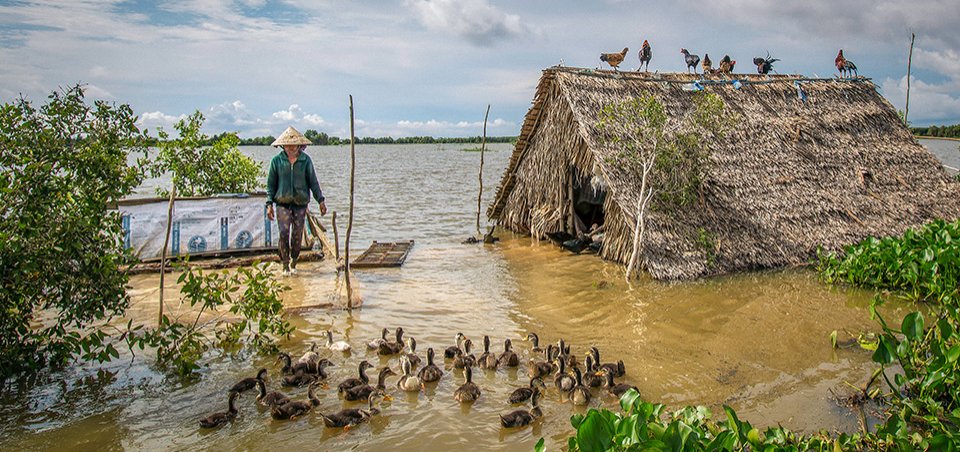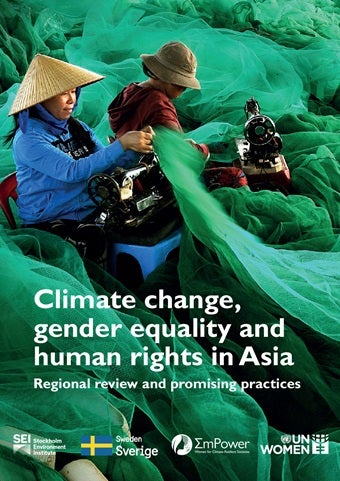Marginalized women and girls need better representation to fight impacts of climate change and COVID
Date:
Author: Paulene Santos

Marginalized women and girls across Asia and the Pacific are at risk of being left behind by pandemic recovery efforts unless they are given a louder voice and more participation in decision-making. In particular, the groups already most affected by climate change have seen that vulnerability has been compounded by the Covid-19 outbreak and the measures to contain it.
This was the key message to come out of an inaugural dialogue of the “Feminist Climate Action by One and All: Generation Equality, Human Rights and Climate Justice” held in Bangkok last week by UN Women’s regional office for Asia and the Pacific, bringing together civil society, independent experts, government officials, gender-equality advocates and climate activists from across the region.
Women who are “most disadvantaged” need “equal participation in all relevant planning and decision-making processes,” with regards to multi-stakeholder engagement for climate action, said Saad Alfarargi, the UN Special Rapporteur on the right to development. This includes in particular “women with disabilities, girls and young women, minority women, indigenous women, and members of other disempowered and marginalized groups,” he said.
Khadeeja Naseem, the Deputy Minister of the Ministry of Environment in the Maldives also acknowledged that “women’s empowerment and participation is essential in achieving the transformative changes necessary to move towards a greener, just and prosperous future.”

The report aims to provide a better understanding for policymakers in Asia about what focusing on human rights and gender equality in the context of climate change entails in practice. [Download]
According to a recent report by UN Women and the Stockholm Environment Institute, already marginalized populations who are more vulnerable to the impacts of climate change also face multiple risks to their fundamental human rights including the right to life, health, and access to key natural resources. The study was carried out under the programme EmPower: Women for Climate-Resilient Societies, and funded by the Swedish International Development Cooperation Agency.
Due to the Covid-19 pandemic, progress by governments towards their gender equality and climate-related goals has stalled, and in some cases regressed. The ongoing health crisis has also alarmingly increased push-back against civil society organizations, narrowing their operational space. In these circumstances it is even more critical that we address the needs of the most vulnerable.
The dialogue event helped to identify the challenges and key actions needed to ensure a sustainable and inclusive future beyond COVID-19.
“In the past 12 months we have witnessed how Covid-19 has exacerbated the negative impacts” of existing gender inequalities,” said Kehkashan Basu of Green Hope Foundation, one of the leaders of the Action Coalition under the UN Women’s Generation Equality Forum initiative on Feminist Action for Climate Justice. This has ended up “pushing many of the already disfranchised women and girls further into the mire of poverty, abuse, exploitation and deprivation,” she added.
Too many of the current initiatives around Covid response and climate change are gender blind as well. “We absolutely need women-focused investments particularly those at the community level that have women as key beneficiaries,” said Zonibel Woods, a Senior Social Development Specialist from the Asian Development Bank.
“We landed in this bad place globally because of our unfair systems,” said Viva Tatawaqa. “We need to work to change those systems. “As feminists we don’t look at climate change as a standalone issue but as one interlinked with the issues of ecology, environment, development and social justice,” added the Management Collective Member of DIVA for Equality in Fiji.
The event ended on a celebratory note as a select group of women climate leaders shared their personal journeys on the path towards gender-responsive climate action. There was also a call to action from all the delegates to ensure the prioritization of gender-sensitive and human rights-based climate change solutions, including investment in women-focused initiatives, development of technical standards for collecting data on gender and environment as well as engaging youth.
“Affected women have to be brought to the roundtables,” said Chandni Joshi, Chairperson of the Women-friendly Disaster Management Group in Nepal, as she talked about the problem of under-representation.
And it is important to not look at women as a homogenous group, but also consider how they experience an extra layer of discrimination if they are a part of other marginalized groups, such as the case for women belonging to ethnic minorities, the disabled, and members of the LGBTQ+ community. "An intersectional human-rights based approach enables transformative and more effective climate action," shared Camille Pross of the Stockholm Environment Institute.
Puji Pujiono also pointed out that even when data is present there is a need for more effective gender-responsive interpretation. “We need to pull our resources together and come up with a technical standard for gender and environment statistics. Furthermore, it is essential to convince the unconvinced and convert the unconverted to believe that statistics really count,” he stated.
The Action Coalition on Feminist Action for Climate Justice is just one of the coalitions under the Generation Equality Forum initiative that presents a vital moment for activists, feminists, youth and allies to achieve transformative change for generations to come. “Through this multi-stakeholder dialogue on ‘Feminist Climate Action by One and All’ we expect to bring the global discussions to the regional level and identify areas of collaboration and cooperative action in our region,” said Mohammad Naciri, Regional Director of UN Women for Asia and the Pacific.